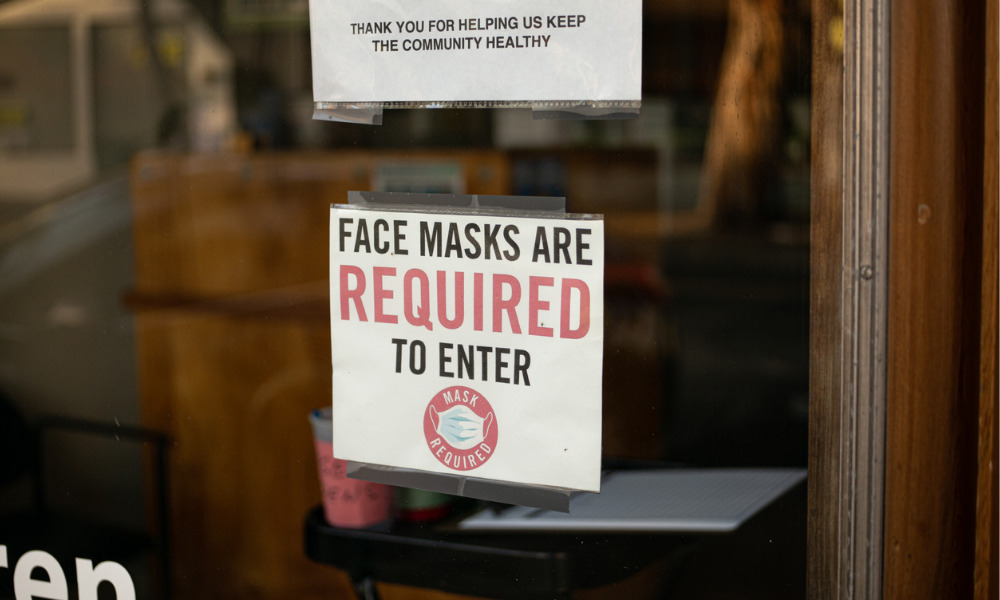Law requires balance of obligations, Chief of Commission and Tribunal says

The Human Rights Tribunal of Alberta has dismissed two separate discrimination complaints arising out of corporate policies that required all customers, without exception, to wear a mask for access into retail premises.
Michael Gottheil, Chief of the Commission and Tribunals, ruled that “human rights law, including the Charter of Rights and Freedoms, requires a balancing of rights, with the obligation of an employer or service provider to accommodate the effects of a discriminatory policy, to the point of undue hardship.”
He added: “I appreciate that the complainant[s] may not agree with the science supporting the respondent’s policy or have the resources to challenge it. But in the absence of information challenging the respondent[s’] evidence about the necessity of a mandatory face mask policy to protect employee, customer, and public health, I am unable to find there is a reasonable basis to have this. . .proceed to a hearing.”
The tribunal upheld a Human Rights Commission’s director’s earlier decisions to dismiss the complaints.
“The big takeaway from these two decisions is those mask policies requiring customers to wear a mask to enter retail stores or other premises, without exception for persons with medical conditions preventing mask-wearing, do not violate human rights law in Alberta, MLT Aikins LLP lawyers Jean Torrens and Julie Ward wrote in a recent blog posting.
“This holds true as long as such policies are (or were at the time a complaint arose) based on either current public health regulations, or comprehensive and scientifically-verified medical information.”
MLT Aikins lawyer Megan Kheong says the two cases are significant because they are among the very first - certainly at the human rights tribunal level - to deal with mask protocols "and are instrumental" in offering guidance on how adjudicators might approach these issues, whether there are public health rules in place or company policies.
 Megan Kheong, MLT Aikins LLP
Megan Kheong, MLT Aikins LLP
The two cases deal with complaints from customers who felt that their human rights were violated because the retailers in question had mask policies in place.
In Beaudin v Zale Canada Co o/a People’s Jewellers, 2021, the jewellery retailer put in place the policy based on the advice of medical professionals and in accordance with peer-reviewed medical research.
As an alternative to mask-wearing, People’s Jewellers’ policy offered those who did not want to wear a mask telephone shopping by appointment, online shopping, home delivery and curbside pick-up.
In the second case, Szelez v Costco Wholesale Canada Ltd., 2021, the big-box retailer had a policy similar to People’s, in accordance with active provincial and municipal public health requirements at the time. Those public health requirements recognized that some individuals would be unable to wear a mask for medical or other reasons.
As an alternative to wearing a mask, Costco provided customers with a face shield or various online and home delivery options.
Following the implementation of these policies, complaints of discrimination arose in both cases when the companies denied entry to customers under their respective masking policies.
In the case of People’s Jewellers, the complainant was not allowed in the store without a mask, despite saying he had a disability that prevented him from wearing a face mask.
The complainant explained that he was “exempt” from the requirement to wear face masks because of health reasons, Gottheil wrote.
“While there is some dispute about exactly what was said, the store staff indicated that the complainant could not enter the store, but that other accommodations were available. . . .The complainant objected, but the store staff was firm, and the complainant was told to leave.”
In the Costco case, the complainant said he had a disability that prevented him from wearing a face mask. He refused to wear the face shield and submitted to the commission “that the use of a face shield, as an alternative to face masks, was stigmatizing, was meant to single him out as a person with a disability, and would subject him to humiliation.”
After this refusal, an altercation ensued, the police were called, and the complainant was removed from the store.
The complainants lodged complaints with the tribunal, arguing that their rights were discriminated against on the grounds of physical disability, in contravention of section 4 of the Alberta Human Rights Act.
However, the tribunal dismissed both complaints. It ruled that while there was prima facie discrimination, neither complaint had a reasonable basis to proceed.
As a starting point, the tribunal acknowledged that policies requiring masks to be worn for entry on-site do harm those with disabilities, which prevents them from wearing a mask.
However, the tribunal then considered whether the companies introduced the policies for a valid and legitimate business purpose and in good faith. The tribunal also examined whether there were alternatives to accommodate those negatively affected without incurring undue hardship.
In the People’s case, Gottheil wrote that “the fact that public health officials had not, at the time of the incident, instituted a mandatory mask requirement for retail establishments does not determine the question.
He added: “Rather, the question is whether the policy was introduced for a valid and legitimate business purpose, was introduced in good faith, and there were no alternatives available to accommodate those negatively affected, without incurring undue hardship.”
The tribunal ruled that in locations where provincial and municipal mask mandates are in force, it is clear that corporate policies requiring masks for access to retail premises have a valid business purpose.
On the question of whether the policy was “reasonably” necessary, the tribunal considered whether it was impossible to otherwise accommodate individuals with characteristics of the complainants without imposing undue hardship on the company.
The tribunal ruled that policies requiring customers to wear masks before entry are reasonably necessary where they are supported by public health policies and regulations or epidemiological information, or both.
In the Costco case, Gottheil wrote that even if the complainant was correct, face shields were not appropriate for those who could not wear masks, “it does not follow that he is therefore entitled to enter the respondent’s store without a face mask.” The public health regulations and the public health and epidemiological information provided by the respondent establish that restrictions were reasonable and justifiable.
“The allegation that one of the alternatives was not effective in addressing the legitimate health risks does not undermine the reasonableness of the restrictions.”
In their blog post, MLT Aikins's Torrens and Ward wrote these decisions “demonstrate that mask policies requiring customers to wear a mask to enter retail stores or other premises do not violate human rights law in Alberta.
As a key takeaway, they add that organizations should always consider “current public health regulations, or comprehensive and scientifically verified medical information, before implementing such policies to ensure they are legally compliant.” Obtaining legal advice to help draft similar policies is also important, Kheong says. "These organizations were successful, I think, because they had done their due diligence, had a well-drafted policy and made sure they had the scientific evidence to back the enforceability of that policy."
Kheong also says that these decisions, while providing some insight, might not be predictors of how future cases might go, as that would depend on the evidence presented. "It is notable that the complainants in these cases did not provide any evidence in support of their position that the policies and regulations were unreasonable."










